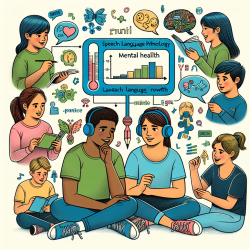Empowering Young Minds: The Crucial Link Between Language Ability and Mental Health
At TinyEYE, our mission is to enhance the lives of children through innovative online therapy services. A recent study titled Relationships between concurrent language ability and mental health outcomes in a South African sample of 13-year-olds provides invaluable insights into how language ability can impact mental health outcomes in adolescents. This research, conducted in a high-adversity South African context, underscores the importance of language skills in fostering positive mental health.
Key Findings from the Study
The study highlights several significant relationships between language ability and mental health outcomes:
- Attention Problems: Adolescents with lower language abilities exhibited more attention problems. Improving language skills can potentially reduce these issues, leading to better academic performance.
- Self-Esteem: Higher language ability was associated with better self-esteem, particularly in areas related to peer interactions and body image. Enhancing language skills can thus boost a child's confidence and social interactions.
- Depressive Symptoms: Adolescents with lower language abilities showed higher levels of depressive symptoms. Addressing language deficits early on can help mitigate these risks.
Practical Implications for Practitioners
As practitioners, it is crucial to integrate these findings into our therapeutic approaches to create better outcomes for children. Here are some actionable steps:
- Early Intervention: Implement language development programs as early as possible. Early intervention can significantly reduce the risk of mental health issues later in life.
- Parental Training: Educate parents on the importance of language development and provide them with strategies to support their children's language skills at home.
- Teacher Training: Train teachers to recognize language difficulties and provide them with tools to support language development in the classroom.
- Comprehensive Assessments: Use comprehensive assessments to identify language deficits early and tailor interventions to meet individual needs.
Encouraging Further Research
While this study provides a strong foundation, there is still much to learn about the intricate relationship between language ability and mental health. We encourage practitioners to engage in further research to explore:
- The long-term effects of early language interventions on mental health outcomes.
- The role of cultural context in the relationship between language ability and mental health.
- The potential benefits of high language ability in various socio-emotional domains.
By continuously integrating research findings into our practice, we can create a brighter future for the children we serve.
To read the original research paper, please follow this link: Relationships between concurrent language ability and mental health outcomes in a South African sample of 13-year-olds.










